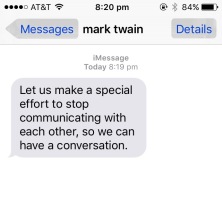
“Why don’t you call her?” I asked.
A look of stunned incomprehension swept across my daughter’s face, draining it of all color. Had I suggested to her that she set fire to her legs, I doubt the expression would have been much different.
“Well, I texted her over an hour ago to ask if she wanted to go to the movies but she hasn’t replied.”
“OK. You do know the thing you’ve got in your hand – the thing that is always in your hand – is called a phone, right?”
“Yeah” she said, with barely disguised derision. Although not uttered, the accompanying “duh!” was loud and clear.
“Just call her. Have a conversation. If she doesn’t answer, leave a message. Do you want to go to the movies?”
“Yeah.”
“Then don’t sit around waiting. Do whatever you can to make it happen.”
“OK” she said, apparently to her feet.
The moment passed. My daughter returned to her room reflecting, no doubt, on the slightly eccentric, outdated mind of the peculiar, antique father she had somehow acquired. I remained in the kitchen, reflecting on my fears for the future of humanity.
 I wondered if we are in danger of losing the ability – or forgetting how – to speak to each other?
I wondered if we are in danger of losing the ability – or forgetting how – to speak to each other?
Slowly, an unnerving image of UK Prime Minister’s Question Time a few years hence started to form in my mind.
Gone was the raucous debate as backbenchers jump to their feet, waving papers, insistent that their voices be heard; the Prime Minister and Leader of the Opposition remain seated, leaving the despatch boxes in front of them untouched. Only the incessant click of blurring thumbs breaks the silence of the House of Commons.
650 Members of Parliament are looking down at their devices, some are wearing headphones. Suddenly, a cacophony of electronic alerts fills the chamber as a group text message is sent.
“PMs ideas for @NHS funding are cray cray. LMAO. #PMhasnoclue #budgetdisaster”
“The RtHon mbr is a #loser innit. IDK how he got votes. @NHS on fleek ”
With a shudder, I returned to the present, the conversation with my daughter, and briefly consoled myself that she is, in fact, one of the good ones.
These are not merely the words of a biased father. She can interact with others and engage in intelligent conversation; she can construct a coherent, grammatically correct sentence; she doesn’t say “like” after every other word. How sad is it that such basic skills could soon be considered exceptional? Perhaps they already are.
I realize, of course, that ever since the first moody teenager stomped out of a cave, the apathy, antics and attitudes of the younger generation have driven adults to despair; while those same adults easily exaggerate memories of previous hardships and allow a fortunate amnesia to conceal the transgressions of their own, formative years.
Yet, I think it is safe to say, an inability to communicate, an unwillingness to engage, and a pervasive “Me First!” attitude, are certain to have more consequential ramifications for the future of civilization than the long hair, questionable fashion sense and loud music we employed to rebel against the authority of our own parents.
But it’s different this time. This time the annoyances are not the exclusive domain of surly, uninterested youth. This time the adults are actively participating in, and thereby condoning, the behaviors.
We see it every day.
We see it as we try to avoid collisions with people walking towards us, heads buried in their devices.
We see it in the noise-cancelling headphones reinforcing the personal bubble that isolates the wearer from any residual risk of human interaction.
We see it in each instant message we hide behind to impart bad news, avoid a potential confrontation or side-step a difficult discussion. (Don’t worry; the sad-face emoji will make everything alright.)
We see it in the erratic swerving of the texting driver, oblivious to the existence – or even to the possibility – of other road users.
We see it in a world where the 140-character remark trumps constructive debate; where loud ignorance trumps quiet intelligence; where, in the process, we create an environment in which a terrifyingly large percentage of the U.S. population thinks that someone named Trump should be their next President.
As we allow our lives to grow ever more insular, the world beyond us fills the void. Its perils are no less severe, yet we are creating more space for them; ceding territory as we retreat into our own, selfish lives. Lives where conversation is an interruption; compromise is weakness; and others, quite frankly, are in our way.
What chance do we have to effectively confront something as sinister as the scourge of terrorism if our ability to constructively discuss problems, express and defend opinions, and to negotiate solutions, continues on its inexorable decline? The answers to such complex issues, already elusive, may simply become unobtainable.
As one year passes into history and our minds turn to resolutions for this one, it’s time to commit to conversation. Resist the temptation to hide behind a device; initiate a discussion instead of an instant message; take the time to listen to another point of view; realize it’s more important to be interested than interesting.
You may well find, looking back at you, a real smiley face.
Nick Orchard
4th January 2016


Thanks Nick, being able to read this on my phone during this mornings meeting on workplace communication made the experience a lot more bearable.
LikeLike